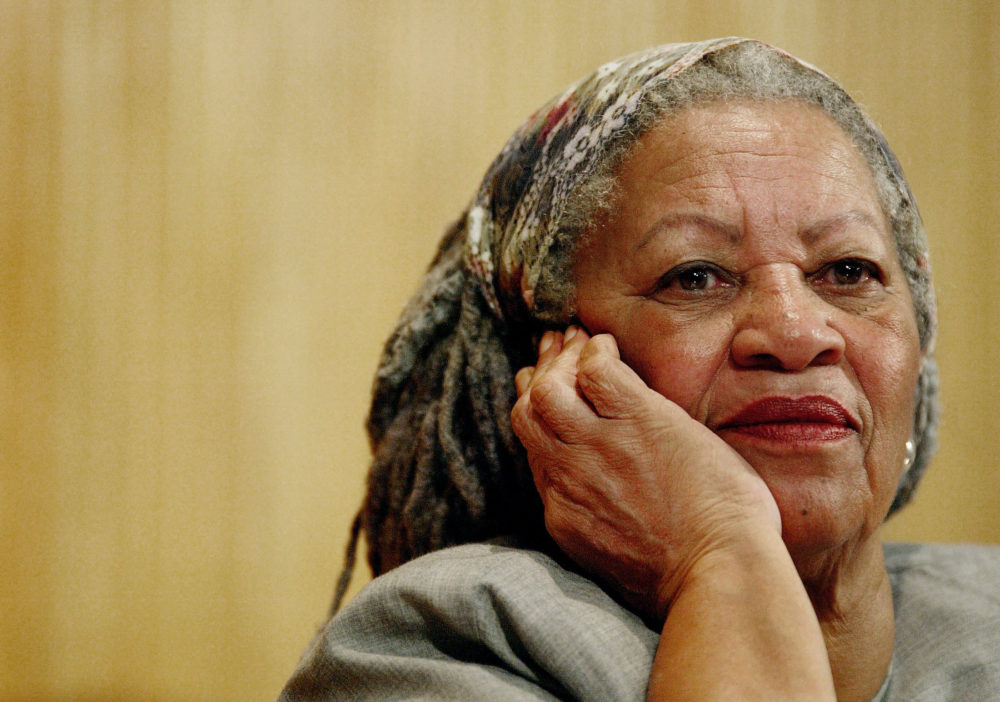Advertisement
Commentary
'We Thank You': Black Writers In Boston Remember Iconic Author Toni Morrison

There are some individuals who exude such breadth of wisdom and timelessness that we slip under the impression that they'll live forever. Toni Morrison embodied this.
When my grandmother introduced me to Toni Morrison, I was a young black girl searching for a reflection of myself amid the books I read in school that centered white characters. Morrison's books introduced me to the concepts of colorism, to folk tales about tar babies and black folk who could fly. Her work took me to a world that destabilized the white gaze and audaciously shut it out.
As a writer and a black femme, Morrison shaped and guided my writing in ways that are difficult to clearly articulate. When news of her death seeped through the annals of the internet, I found myself scrambling for words but everything seemed to stick stubbornly in my throat. Many other black women I saw expressing grief on social media seemed to echo this same sentiment: What words are there to pay homage to someone who changed how we use language?
Sometimes there are no words, only emotions. Five black writers and creatives from Boston shared their feelings with us on Toni Morrison's passing:
Jovonna Jones
Teacher and writer in Black Cultural History, Aesthetics and Theory; doctoral candidate at Harvard University
To Toni Morrison,
You were alive and alert, ready for what the ancestors gave you, told you, made you see, and sometimes, what they kept from you, whether by force or by choice. You knew that knowledge is not neutral, but deeply political, deeply spiritual. You bore witness to the particular kind of knowing that black folks have embodied, studied, and created in order to enact the conditions for a freer form of living. This was your ministry, as writer and editor, as teacher, as healer: to give us back our stories and more, to read black folks back to ourselves, with tenderness. I'm forever grateful for your ability to describe the feeling of something that is unsayable, to tend to the thing that does not yet have words. Most of all, I cherish the ways you've consistently and passionately honored black women: black women of the archive, black women writers in and across your time, black women in the wilderness of cultural imagination. Black women who, out of the profound desolation of their realities, may very well have invented themselves. We thank you.
Nakia Hill
Writer and author of 'Water Carrier'
As ritualistic as it is for Black girls to know how to double dutch, the same rule applies when it comes to claiming your favorite book written by the honorable Toni Morrison.
For Black girls, the question is never, have you read a book written by Toni Morrison? The real question is, which of her books have you read?” And If you don’t want your Black girl magic card revoked, your response better be quick and without hesitation: “The Bluest Eye”, “Beloved”, or “Sula.”
Before I identified as a writer, I knew that Toni Morrison was the bar. All of the members of the white washed canon just couldn’t equate to her greatness. Each book I read, comprehended, and completed felt like I had crossed over into the blackest literary sorority. Once I finished reading Morrison’s books, I felt a bit smarter, a bit wiser, and aged like fine wine. Her written work had so much depth and heart. And for that reason, I will forever cherish and carryout her brilliance and legacy in my work.
Serina Gousby
Essayist and poet, Boston Writer of Color Group Coordinator
I was not aware of Toni Morrison’s work until after high school graduation. As I was preparing to step in a new environment at a predominately white college, I wanted to spend the summer learning about black writers I didn’t learn about. Since non-fiction is one of my favorite genres, I gravitated towards Ms. Morrison’s essays and interviews. Her words and advice taught me that my writing doesn’t always have to be beautiful and that my pain is always allowed to be told. She’s also a true example that Black writers can be seen and successful, without having to tone down their blackness. Even now with her recent book, "The Source of Self-Regard," I’m feeling more confident as a black writer in the journey I’m in now. I can’t thank her enough.
Stephen Hamilton
Visual artist and educator
I remember re-reading "Song of Solomon" while studying in Nigeria back in 2015. It was through Toni Morrison's writing that I was able to make sense of my experience. The most complex tenants of African thought were eloquently brought to life through her characters. Her exploration of blackness transcended time and space, simultaneously ancient and new. Through the pages of her book I was able to process and understand the icons of the ancient hunters, the Awon Iya wa, the people who could fly and so much more. I read magic in her words and it helped me comprehend the magic that surrounded me. She told the tale of a boy who made a hero's journey to learn the story of his family and it was through his travels that he learned who he was. I saw myself in Milkman, I saw every black boy looking for himself. Reading Toni Morrison by moonlight in Ogidi Ijumu made my journey make sense. I will forever be changed.
Margo Gabriel
Writer and creative
I was in the 10th grade when I read the late Toni Morrison's "Beloved." The language was captivating, real, and tragic. Morrison weaved her words like strands of gold that sparked my love for writing. I was very much a bookworm and an introvert fascinated by stories centered on the vastness of Black history and family life glorified on the printed page. Her work helped me weather the storm of double consciousness and the reality of my existence despite a world bent on diminishing the greatness of my ancestors. Morrison's opus, like jazz — improvisational and melodic — taught me the depth and range of the Black experience. That we are multi-dimensional and her writing exemplified the beauty and richness that sharing a story, was also sharing our collective story with the world.
Her work is at once sharp and speaks to a cadence that not only defies stereotypes, but has also shaped generations past, present and future on what it means to be a Black woman writer. In her absence, Morrison’s impact on the world is prolific, though difficult to enumerate, her work will continue to inspire.
This article was originally published on August 07, 2019.
This segment aired on August 7, 2019.
